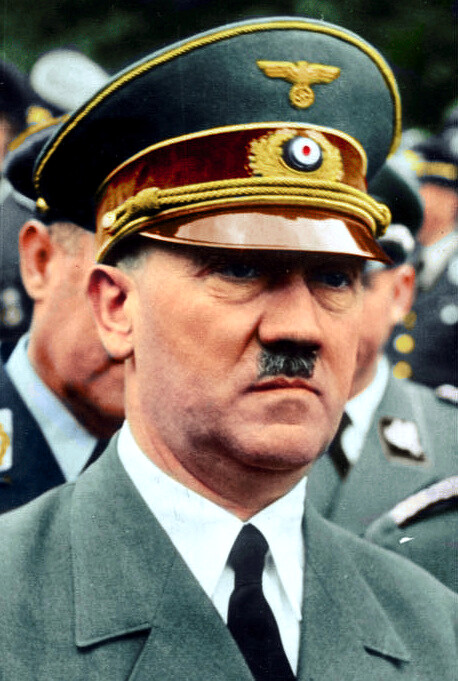The Stars and Stripes (May 2, 1945)
German radio reports:
HITLER DEAD
Wednesday, May 2, 1945
Adolf Hitler at his height
Adolf Hitler, for 12 years the master of Germany and the man who set out to conquer the world, died yesterday afternoon, the German radio at Hamburg announced last night.
Declaring that Grand Adm. Karl Doenitz, commander-in-chief of the German Navy, was Hitler’s successor, the radio states:
It is reported from Der Fuehrer’s headquarters that Der Fuehrer, Adolf Hitler, has fallen this afternoon at his command post in the Reich Chancellery, fighting to the last breath against Bolshevism and for Germany.
Death is not explained
The announcement did not explain how Hitler, who was 56 years old 12 days ago, had “fallen.” Russian forces in recent days have been battling toward the massive Chancellery that Hitler built in the Wilhelmstrasse, in the center of Berlin.
The broadcast reported that on April 13, Hitler named Doenitz as his successor. Then Doenitz came on the program with a fiery promise to keep up what he termed “the struggle against Bolshevism.” He said the German would fight American and British forces to the extent that they hindered his fight against Russia.
There was no indication as to the whereabouts of Heinrich Himmler, Gestapo chief and leader of the German home defense forces, who has been reported offering to surrender. Neither was there any word of Propaganda Minister Paul Joseph Goebbels or other Hitler henchmen.
The announcement of Hitler’s death was preceded by the playing of solemn Wagnerian music, including “Twilight of the Gods.” The southern German radio kept up a program of light music all through the program from the north, indicating that communication is broken down between the two German pockets.
Doenitz came on the air immediately after the brief announcement of Hitler’s death, saying:
German men and women, soldiers of the German Wehrmacht:
Our Fuehrer, Adolf Hitler, has fallen. The German people bow in deepest mourning and veneration.
My first task is to save the German people from destruction by Bolshevism. If only for this task, the struggle will continue.
Adolf Hitler recognized beforehand the terrible danger of Bolshevism and devoted his life to fighting it. At the end of this, his battle, he stands as a hero in the battle of the capital of the Reich.
‘We shall fight’
The Fuehrer has appointed me as his successor. Fully conscious of the responsibility, I take over the leadership of the German people at this fateful hour.
It is my first task to save the German people from destruction by Bolshevists, and it is only to achieve this that the fight continues.
As long as the British and the Americans hamper us from reaching this end, we shall fight to defend ourselves against them as well. The British and Americans are not fighting for their own interests, but for the spreading of Bolshevism.
Doenitz, whose appointment came as a surprise, called on the German people to help him to the utmost and urged them to keep order and discipline. Only by complete fulfillment of every German’s duty, he said, could the country avoid collapse.
Issues order to troops
Doenitz also issued an order of the day to the Reich’s armed forces in which he repeated the same determination to “save” the Germans from Bolshevism. Assuming supreme command of all the armed forces, he said Germany would continue the fight to save “hundreds of thousands of German families from slavery and destruction.”
“The situation,” he added, “demands from you who have already accomplished such momentous deeds – and who are now wishing for the end of the war – unconditional exertions.” The latter was an obvious answer to the Allied demand for unconditional surrender.
He told his decimated Wehrmacht, Luftwaffe and navy:
Only by executing my orders without reserve can chaos and annihilation be avoided. The coward and traitor is he who just now shirks his duty – and who thus brings death or slavery upon German women and children.
The oath of allegiance which you have given the Fuehrer is now for every one of you immediately due to me as the successor whom the Fuehrer appointed.
German soldiers, do your duty! The very lives of our people are at stake!
The 50-year-old Doenitz, regarded as the Nazis’ top man in the navy, has always been held high in Hitler’s esteem and has been classified as a fervent party man from the outset of the Nazi movement. He led the Atlantic submarine wolfpacks before he became navy chief two years ago. He was confined in an insane asylum in Manchester, England, during the First World War.
